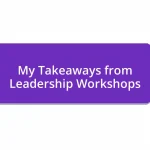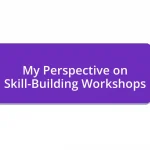Key takeaways:
- Utilize techniques like “Table Reads” and physicality to enhance character depth and creativity in rehearsals.
- Set clear objectives and adapt plans flexibly to maintain focus and foster a collaborative environment.
- Engage fellow performers through personal storytelling and active listening to strengthen connections and performances.
- Embrace feedback as a growth tool, encouraging specific, actionable insights to improve individual performances.
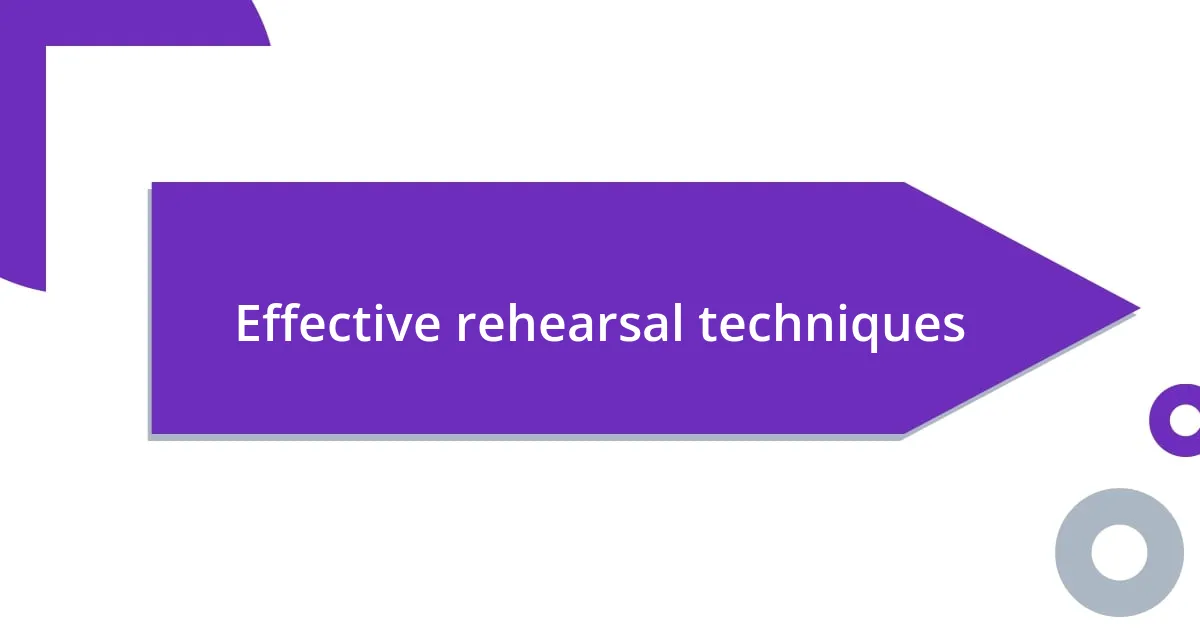
Effective rehearsal techniques
One technique that I’ve found invaluable in rehearsals is the “Table Read.” It allows the entire cast to voice their lines together, which fosters an understanding of the flow and rhythm of the piece. Have you ever noticed how a single reading can ignite a spark of creativity in everyone? It certainly does for me, creating a lively energy that often leads to fresh interpretations.
Another approach that I can’t stress enough is the importance of physicality in rehearsals. When I incorporate movement and blocking early on, the characters begin to feel more three-dimensional. I remember a rehearsal where we played with space—suddenly, just shifting a few feet apart made a grueling scene burst with tension. It made me realize how physical presence can transform the emotional landscape of a performance.
Lastly, I’ve found that utilizing feedback sessions after each rehearsal is crucial for refinement. Sharing thoughts in a supportive environment not only strengthens our ensemble but also allows us to see the piece from different perspectives. Can you imagine how empowering it feels to hear that someone’s been touched by your portrayal? It fuels my passion and pushes me to dig deeper each time we gather.
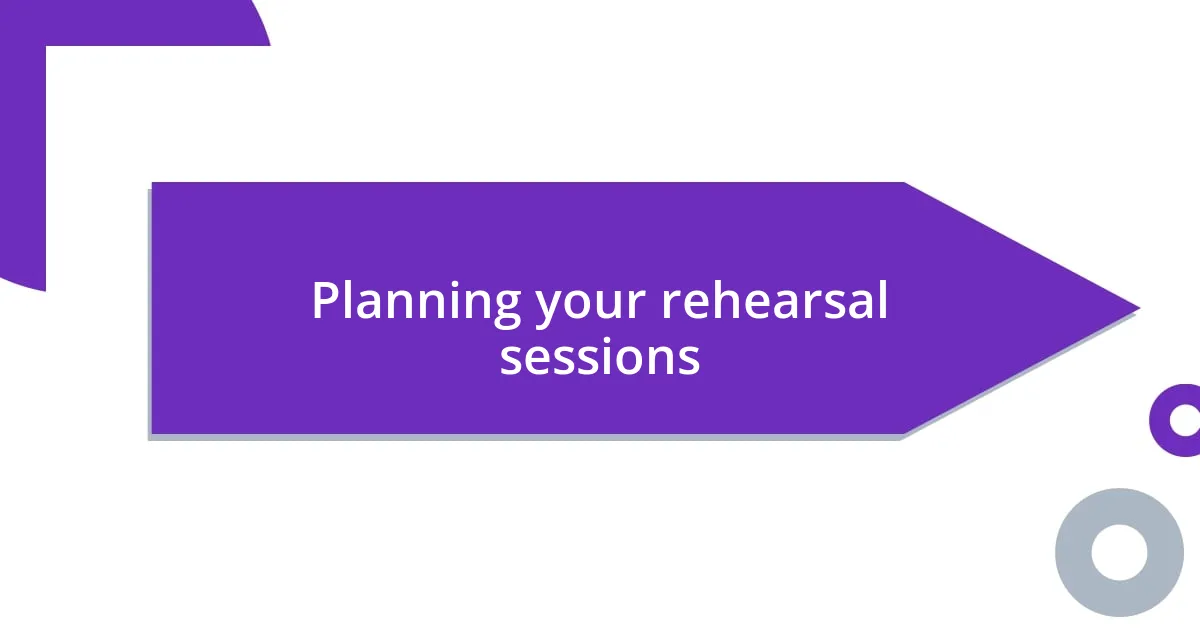
Planning your rehearsal sessions
When planning your rehearsal sessions, I’ve learned that setting clear objectives can make a big difference. For instance, I remember a time when we walked into a rehearsal without a defined focus. It led to chaos and confusion. Since then, I always set specific goals for each session, whether it’s working on character motivations or perfecting a particular scene. This clarity brings a sense of purpose and keeps everyone engaged.
Another key aspect of planning involves the flexibility to adapt. I’ve had countless rehearsals where things didn’t go as intended, and that’s perfectly fine! One memorable evening, we had to scrap our plan entirely due to unforeseen circumstances. Instead, we held an impromptu workshop focused on improvisation, which turned out to be one of the most creative and refreshing sessions I’ve experienced. Going off-script sometimes can unlock hidden talents and foster unexpected ideas.
Lastly, scheduling breaks is a game-changer! I used to push through without pause, thinking it would enhance productivity. However, I soon discovered that short breaks can actually reinvigorate the group. During one marathon rehearsal, we took a 10-minute pause, and I felt an immediate lift in energy. Returning refreshed allowed us to tackle scenes with newfound enthusiasm.
| Approach | Description |
|---|---|
| Clear Objectives | Establish specific goals for each session to maintain focus and engagement. |
| Flexibility | Be ready to adapt your plan based on the group’s needs or unexpected situations. |
| Scheduled Breaks | Incorporate breaks to refresh energy levels and enhance creativity. |
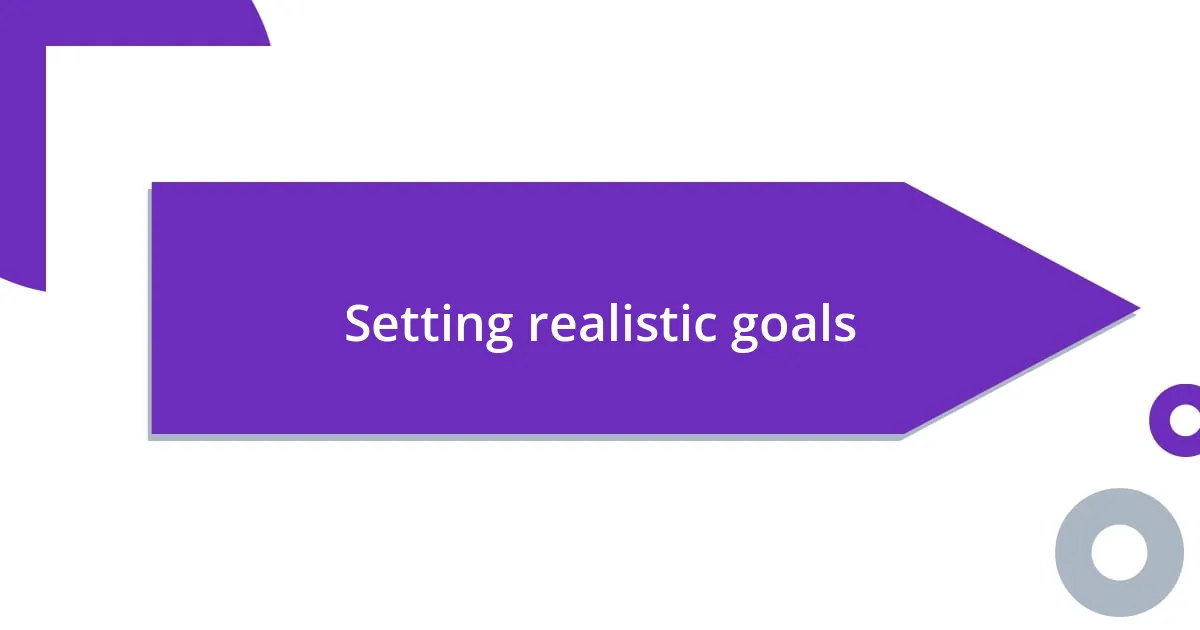
Setting realistic goals
Setting realistic goals has been a transformative practice for me in rehearsals. I’ve learned that these goals need to be attainable yet challenging enough to foster growth. For example, during one rehearsal, we aimed to explore a character’s backstory in depth. While I thought this would take a long time, breaking it down into smaller discussions made it manageable and ultimately more revealing. It’s such a relief to see everyone on the same page, feeling that sense of accomplishment together.
To effectively set realistic goals, here are a few strategies I recommend:
-
Assess Group Skills: Understand where each cast member is at skill-wise. This helps tailor goals that everyone can work towards without feeling overwhelmed.
-
Prioritize Simplicity: Start with straightforward objectives. For example, focus on nailing a single scene rather than trying to cover the entire play in one go.
-
Celebrate Small Wins: When we achieve smaller milestones, I can’t tell you how uplifting it is! A little acknowledgment can go a long way in boosting morale.
-
Adjust as Needed: If a goal feels too ambitious or unrealistic, I suggest revisiting it. Flexibility can make a rehearsal feel less like a chore and more like a collaborative journey.
Embracing this approach has made our rehearsals not just productive but genuinely enjoyable, cultivating an environment where everyone feels invested and inspired.
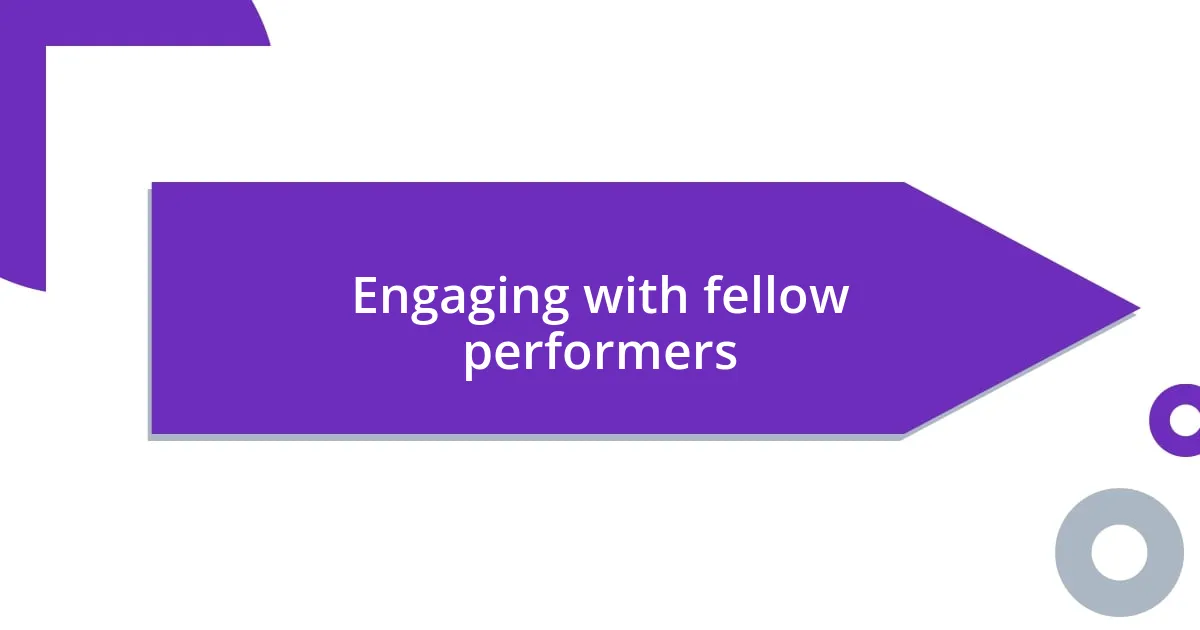
Engaging with fellow performers
Engaging with fellow performers is something I cherish in every rehearsal. I remember one session where we decided to share personal stories related to our characters. This simple act not only deepened our understanding of each role but also created a stronger bond among us. Has there been a moment in your rehearsals when vulnerability turned into a powerful connection? In my experience, those moments are often the most memorable.
I’ve also found that collaborative exercises, like partner work, can invigorate the atmosphere. During a particularly intense rehearsal, we paired up and took turns directing each other in a scene. I was amazed at how fresh perspectives breathed new life into what felt like a stale routine. It’s fascinating to see how switching roles can inspire creativity. Have you tried this technique? It can lead to breakthroughs you didn’t even anticipate.
Lastly, I must emphasize the importance of active listening. I’ve learned that truly hearing my fellow performers goes a long way. In one rehearsal, while another performer was sharing their approach to a scene, I made a conscious effort to listen without interjecting. The insights they shared were enlightening and led to a richer interpretation of our work. I often ask myself—how can I support my fellow performers better? By fostering an environment where everyone feels heard, we cultivate trust and enhance our collective performance.
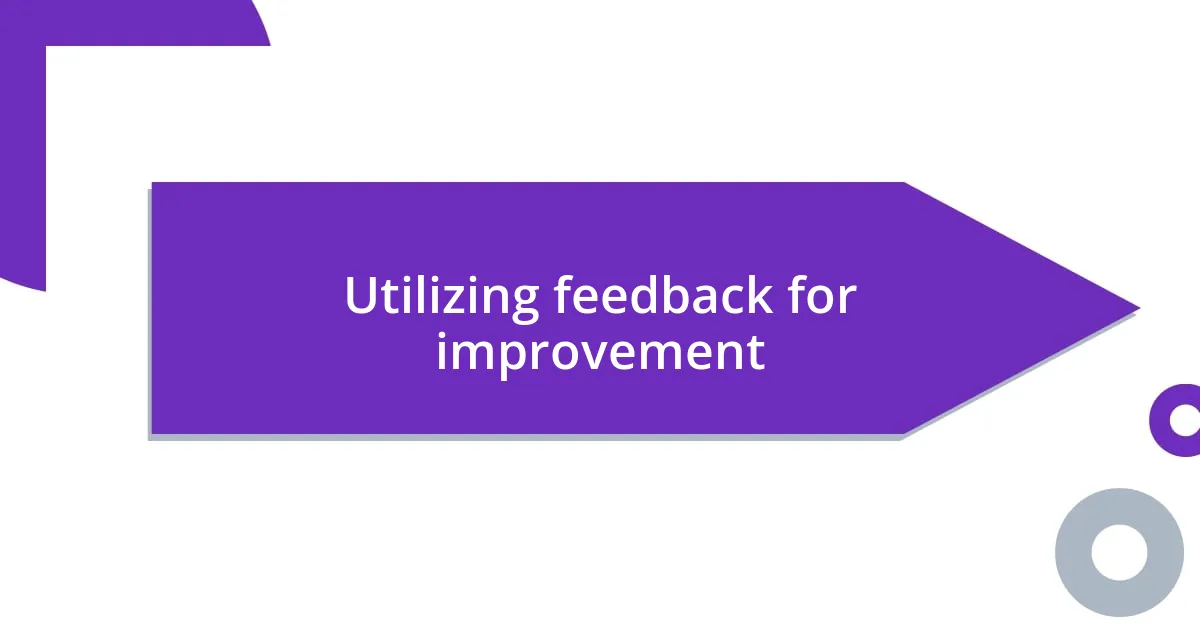
Utilizing feedback for improvement
Utilizing feedback for improvement has been quite a journey for me in rehearsals. Early on, I was hesitant to receive criticism, thinking it would undermine my confidence. However, one pivotal moment sticks out. During a dress rehearsal, a director pointed out a subtlety I had missed in a scene. I initially bristled at the suggestion, but after some reflection, I realized it opened up a whole new dimension to my character. Embracing feedback, even when it feels uncomfortable, really can transform our performances for the better.
I find that creating a space for open dialogue fosters a culture of growth. I often encourage my fellow actors to share thoughts on each other’s performances. In one rehearsal, after a particularly challenging scene, we took a few minutes to discuss what worked and what didn’t. The process felt like a group therapy session for actors! It was incredible how sharing our views not only improved our individual performances but also solidified our teamwork. Have you ever experienced that kind of shared vulnerability? It truly can elevate the overall quality of the production.
To implement effective feedback, I recommend being specific and actionable. I remember receiving vague comments that left me more confused than enlightened. So, I’ve learned to ask, “What exactly can I improve?” For instance, when a peer suggested I work on my pacing during a dramatic moment, it clicked for me. I practiced deliberately slowing down my delivery, and the impact was striking—both on stage and in audience reactions. So, have you considered how precise feedback could refine your craft? It’s a powerful tool that can lead to real growth.
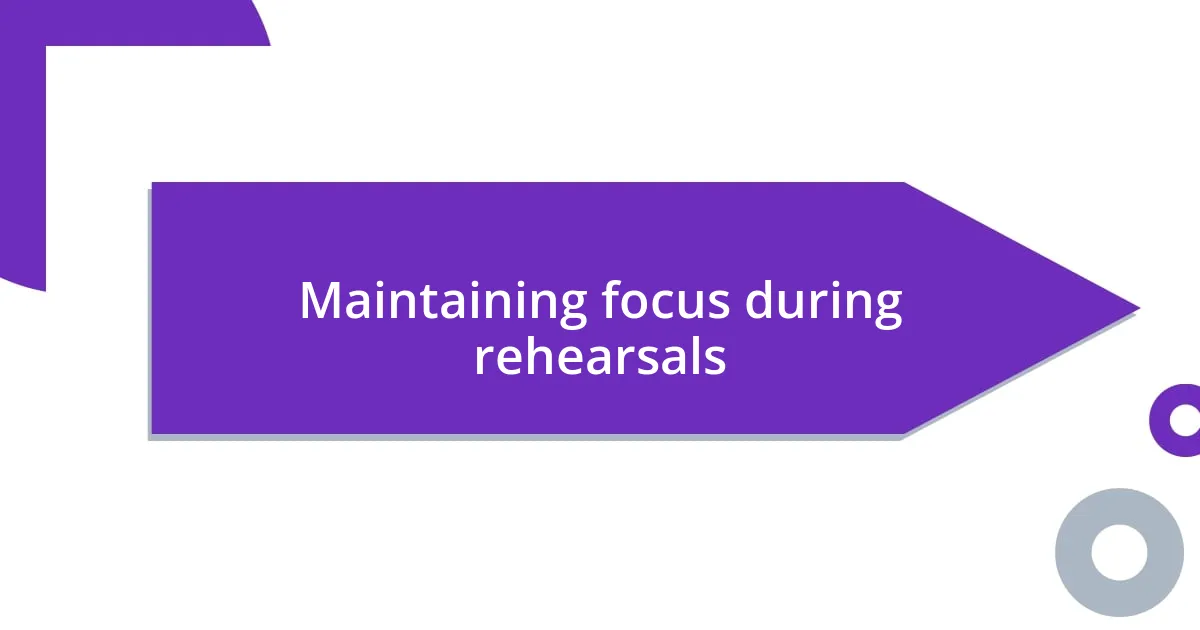
Maintaining focus during rehearsals
Maintaining focus during rehearsals can sometimes feel like an uphill battle. I remember a session where we were all tired and distracted, just going through the motions. It was then that our director suggested we take five minutes for a mindfulness exercise. Pausing to clear our minds brought a refreshing clarity that sharpened our focus for the rest of the rehearsal. Have you ever tried simply taking a breath before jumping into intense work? It can be a game-changer.
Another strategy I’ve found effective is setting clear intentions for each rehearsal. Before we begin, I like to gather my fellow performers in a circle and share what we each hope to accomplish. For example, during one rehearsal, I expressed that I wanted to explore vulnerability in my character. Hearing everyone’s goals created a sense of camaraderie and accountability. When we actively commit to supporting one another, the energy shifts, and it feels like we’re all in this together. Doesn’t having a united purpose make it easier to stay focused?
Lastly, I often utilize physical cues to help maintain my concentration. In one particular rehearsal, I started using a fidget spinner during downtime to keep my hands busy. It sounds silly, but it directed my remaining energy toward something non-distracting. I found that I could focus more on the scene when the spinner was in action. Have you identified any little habits that help you stay grounded? Sometimes, those small actions have a surprisingly big impact on our ability to concentrate and perform at our best.
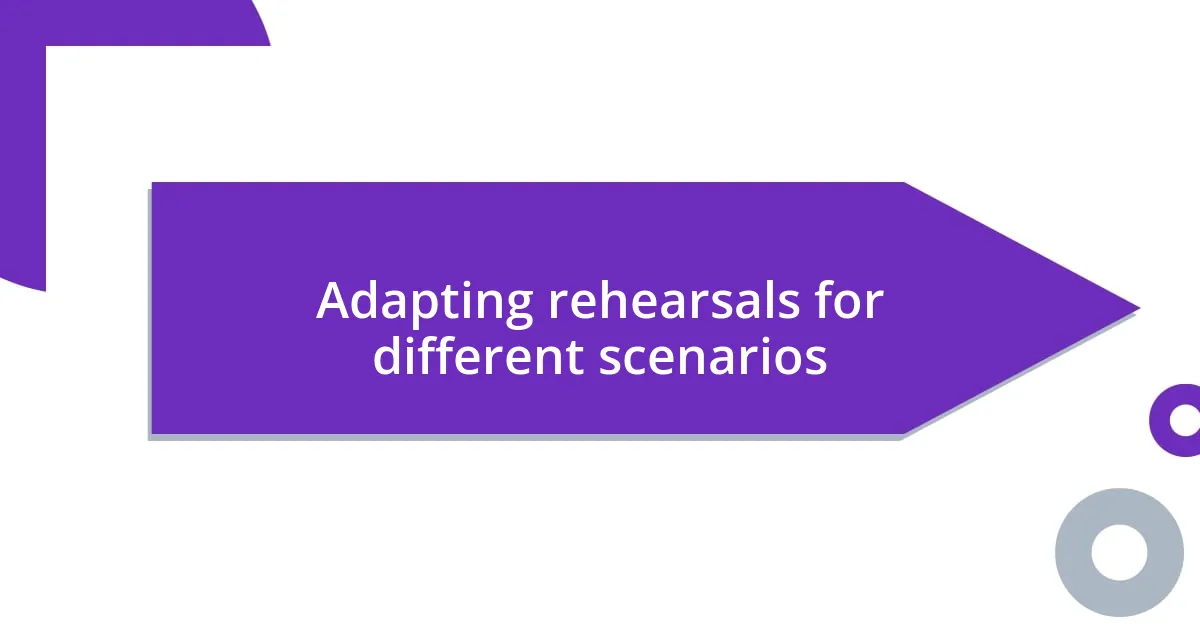
Adapting rehearsals for different scenarios
Adapting rehearsals for different scenarios is something I’ve come to embrace as essential. I recall a time when we transitioned from a small, intimate setting for rehearsals to a larger space as the performance date neared. I could feel the energy shift—what worked in the cozy confines suddenly felt lost in the vastness. To adapt, we focused on amplifying our expressions and adjusting our volume, which reinforced my realization: changes in environment require us to recalibrate our approach.
One noteworthy experience was when we had to rehearse a heavy, emotional scene in a bustling outdoor park rather than a traditional studio. Initially, the noise was distracting, but I learned to harness the chaos around us. Instead of fighting against it, I used the ambient sounds to inform my performance. I vividly remember how a passing dog barked at just the right moment, and it made my character’s outburst feel even more genuine. Have you ever thought about how your surroundings can actually feed into your work?
Additionally, I’ve found that the dynamics within a cast can drastically change how we approach rehearsals. In a recent production, we had a lead actor suddenly unavailable due to illness, and we had to adapt quickly. I stepped in for a few run-throughs, and it was both daunting and invigorating. I tapped into my fellow actors’ strengths, encouraging them to experiment in ways they hadn’t thought of before. How often do we take the opportunity to learn from unexpected situations? It’s these moments that often lead to the most significant growth for both individuals and the ensemble as a whole.







